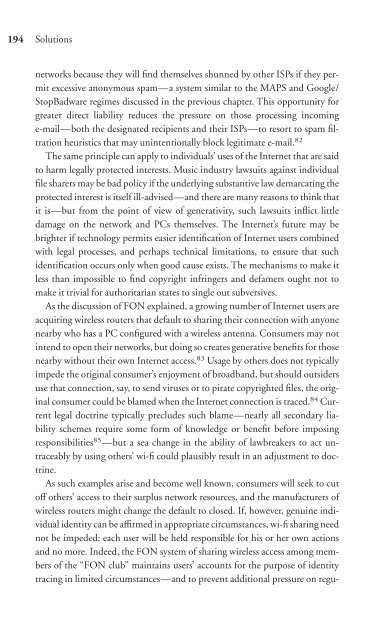Download - Future of the Internet â And how to stop it.
Download - Future of the Internet â And how to stop it.
Download - Future of the Internet â And how to stop it.
You also want an ePaper? Increase the reach of your titles
YUMPU automatically turns print PDFs into web optimized ePapers that Google loves.
194<br />
Solutions<br />
networks because <strong>the</strong>y will find <strong>the</strong>mselves shunned by o<strong>the</strong>r ISPs if <strong>the</strong>y perm<strong>it</strong><br />
excessive anonymous spam—a system similar <strong>to</strong> <strong>the</strong> MAPS and Google/<br />
S<strong>to</strong>pBadware regimes discussed in <strong>the</strong> previous chapter. This opportun<strong>it</strong>y for<br />
greater direct liabil<strong>it</strong>y reduces <strong>the</strong> pressure on those processing incoming<br />
e-mail—both <strong>the</strong> designated recipients and <strong>the</strong>ir ISPs—<strong>to</strong> resort <strong>to</strong> spam filtration<br />
heuristics that may unintentionally block leg<strong>it</strong>imate e-mail. 82<br />
The same principle can apply <strong>to</strong> individuals’ uses <strong>of</strong> <strong>the</strong> <strong>Internet</strong> that are said<br />
<strong>to</strong> harm legally protected interests. Music industry lawsu<strong>it</strong>s against individual<br />
file sharers may be bad policy if <strong>the</strong> underlying substantive law demarcating <strong>the</strong><br />
protected interest is <strong>it</strong>self ill-advised—and <strong>the</strong>re are many reasons <strong>to</strong> think that<br />
<strong>it</strong> is—but from <strong>the</strong> point <strong>of</strong> view <strong>of</strong> generativ<strong>it</strong>y, such lawsu<strong>it</strong>s inflict l<strong>it</strong>tle<br />
damage on <strong>the</strong> network and PCs <strong>the</strong>mselves. The <strong>Internet</strong>’s future may be<br />
brighter if technology perm<strong>it</strong>s easier identification <strong>of</strong> <strong>Internet</strong> users combined<br />
w<strong>it</strong>h legal processes, and perhaps technical lim<strong>it</strong>ations, <strong>to</strong> ensure that such<br />
identification occurs only when good cause exists. The mechanisms <strong>to</strong> make <strong>it</strong><br />
less than impossible <strong>to</strong> find copyright infringers and defamers ought not <strong>to</strong><br />
make <strong>it</strong> trivial for author<strong>it</strong>arian states <strong>to</strong> single out subversives.<br />
As <strong>the</strong> discussion <strong>of</strong> FON explained, a growing number <strong>of</strong> <strong>Internet</strong> users are<br />
acquiring wireless routers that default <strong>to</strong> sharing <strong>the</strong>ir connection w<strong>it</strong>h anyone<br />
nearby who has a PC configured w<strong>it</strong>h a wireless antenna. Consumers may not<br />
intend <strong>to</strong> open <strong>the</strong>ir networks, but doing so creates generative benef<strong>it</strong>s for those<br />
nearby w<strong>it</strong>hout <strong>the</strong>ir own <strong>Internet</strong> access. 83 Usage by o<strong>the</strong>rs does not typically<br />
impede <strong>the</strong> original consumer’s enjoyment <strong>of</strong> broadband, but should outsiders<br />
use that connection, say, <strong>to</strong> send viruses or <strong>to</strong> pirate copyrighted files, <strong>the</strong> original<br />
consumer could be blamed when <strong>the</strong> <strong>Internet</strong> connection is traced. 84 Current<br />
legal doctrine typically precludes such blame—nearly all secondary liabil<strong>it</strong>y<br />
schemes require some form <strong>of</strong> knowledge or benef<strong>it</strong> before imposing<br />
responsibil<strong>it</strong>ies 85 —but a sea change in <strong>the</strong> abil<strong>it</strong>y <strong>of</strong> lawbreakers <strong>to</strong> act untraceably<br />
by using o<strong>the</strong>rs’ wi-fi could plausibly result in an adjustment <strong>to</strong> doctrine.<br />
As such examples arise and become well known, consumers will seek <strong>to</strong> cut<br />
<strong>of</strong>f o<strong>the</strong>rs’ access <strong>to</strong> <strong>the</strong>ir surplus network resources, and <strong>the</strong> manufacturers <strong>of</strong><br />
wireless routers might change <strong>the</strong> default <strong>to</strong> closed. If, <strong>how</strong>ever, genuine individual<br />
ident<strong>it</strong>y can be affirmed in appropriate circumstances, wi-fi sharing need<br />
not be impeded: each user will be held responsible for his or her own actions<br />
and no more. Indeed, <strong>the</strong> FON system <strong>of</strong> sharing wireless access among members<br />
<strong>of</strong> <strong>the</strong> “FON club” maintains users’ accounts for <strong>the</strong> purpose <strong>of</strong> ident<strong>it</strong>y<br />
tracing in lim<strong>it</strong>ed circumstances—and <strong>to</strong> prevent add<strong>it</strong>ional pressure on regu-


